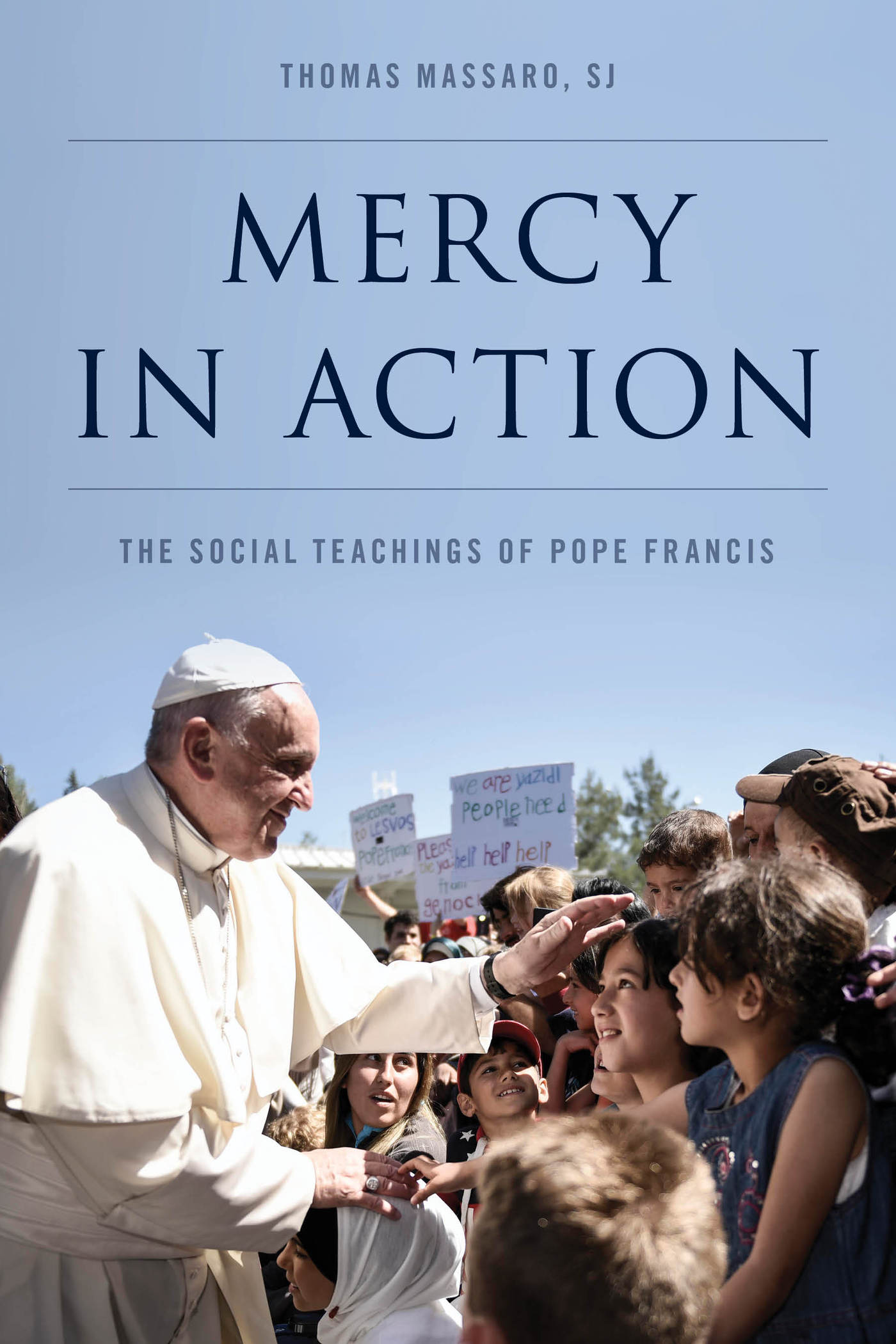Mercy in Action
The Social Teachings of Pope Francis
Thomas Massaro, SJ
Santa Clara University
ROWMAN & LITTLEFIELD
Lanham Boulder New York London
Executive Editor: Sarah Stanton
Assistant Editor: Carli Hansen
Senior Marketing Manager: Kim Lyons
Credits and acknowledgments for material borrowed from other sources, and reproduced with permission, appear on the appropriate page within the text.
Published by Rowman & Littlefield
A wholly owned subsidiary of
The Rowman & Littlefield Publishing Group, Inc.
4501 Forbes Boulevard, Suite 200, Lanham, Maryland 20706
https://rowman.com
Unit A, Whitacre Mews, 26-34 Stannary Street, London SE11 4AB,
United Kingdom
Copyright 2018 by The Rowman & Littlefield Publishing Group, Inc.
All rights reserved. No part of this book may be reproduced in any form or by any electronic or mechanical means, including information storage and retrieval systems, without written permission from the publisher, except by a reviewer who may quote passages in a review.
British Library Cataloguing in Publication Information Available
Library of Congress Cataloging-in-Publication Data
Names: Massaro, Thomas, 1961 author.
Title: Mercy in action : the social teachings of Pope Francis / Thomas Massaro, SJ, Santa Clara University.
Description: Lanham : Rowman & Littlefield, 2018. | Includes bibliographical references and index.
Identifiers: LCCN 2017059081 (print) | LCCN 2018001617 (ebook) | ISBN 9781442271753 (electronic) | ISBN 9781442271739 (cloth : alk. paper) | ISBN 9781442271746 (pbk. : alk. paper)
Subjects: LCSH: Francis, Pope, 1936 | Social justiceReligious aspectsCatholic Church. | Christian sociologyCatholic Church.
Classification: LCC BX1795.S62 (ebook) | LCC BX1795.S62 M37 2018 (print) | DDC 261.8088/282--dc23
LC record available athttps://lccn.loc.gov/2017059081
 TM The paper used in this publication meets the minimum requirements of American National Standard for Information Sciences Permanence of Paper for Printed Library Materials, ANSI/NISO Z39.48-1992.
TM The paper used in this publication meets the minimum requirements of American National Standard for Information Sciences Permanence of Paper for Printed Library Materials, ANSI/NISO Z39.48-1992.
Printed in the United States of America
Preface
Few figures have ever burst upon the world stage as suddenly and dramatically as Pope Francis. Before his election as pope early in 2013, few outside his homeland of Argentina had even heard of Jorge Mario Bergoglio, a Jesuit priest who had served for over a decade as cardinal archbishop of Buenos Aires and was in the process of planning his retirement. Defying the predictions of Vatican watchers, his fellow cardinals elected him pope on the fifth ballot of the papal conclave to replace the retiring Pope Benedict XVI. In selecting the first pope ever to come from the Southern or Western Hemisphere, not to mention the first Jesuit to sit on the Chair of Peter, the electors set off something of a revolution in the Roman Catholic Church. The unlikely election of Francis would be just the first unpredictable development for the man who would soon earn the nickname the pope of surprises.
From the moment he stepped onto the balcony overlooking Vatican Citys Saint Peters Square to be introduced to the enormous crowd drawn by the white smoke, Pope Francis captivated the attention of millions. His evident humility, genuine simplicity of style, and spontaneous joy struck many as extremely refreshinga sharp break from the monarchical model of the papacy. He immediately relinquished the lavish private papal apartments for modest accommodations in a Vatican guesthouse, where he shared meals and casual conversations with travelers passing through. He replaced the papal limousine with a humble Ford Focus for local travel and opted for greatly simplified papal garments. He upended hidebound papal protocols and astonished the world with his bold words and symbolic actions. His very choice of the name Francis (inspired by Saint Francis of Assisi, a beloved saint associated with closeness to the poor, passion for peacemaking, and love of nature) was itself a powerful gesture, one that telegraphed a healthy slice of the papal agenda described in this book. The opening acts of the Francis papacy provided vivid proof that actions speak louder than words, and this book examines not only the bold words of Pope Francis but also the great impact of the symbolic actions the pontiff employs to communicate his message.
Church Social Teachings:
Change and Continuity
The focus of this volume is not on the personality of Pope Francis or his impact on the internal life of the Catholic Churchthe budding industry of Pope Francis literature already covers those topics quite amply. Rather, this book examines the social teachings of Pope Francisthe positions he stakes out and the commitments he makes regarding the wider world of politics, culture, and the economy.
For well over a hundred years, popes have addressed deep concerns about injustice and disorder in modern society and have developed a large and sophisticated body of documents to express the values and principles that should govern public life and the economy. Catholic social teaching documents address such topics as the protection of human dignity, the rights of workers, family life, respect for the natural environment, solidarity with the poorest members of society, and the duty to promote peace and reconciliation. On each of these items and more, Francis has not just embraced the existing teachings of previous popes and church councils but significantly advanced themupdating the message and putting his own distinctive spin on the tradition of social justice advocacy he inherited. He has renewed these teachings by adding certain new perspectives and an enhanced sense of urgency for social change that enlivens the churchs ministry to the marginalized.
The story of Catholic social teaching is a mix of continuity and change. On one hand, the values and principles governing proper human relations in society remain consistent over time, so church pronouncements display a solid core of commitments from one pope to the next. While many welcome the contributions of Pope Francis as a breath of fresh air in a stuffy church, even an innovative pope would hardly ever engineer major departures from church teachings on the basics of human social relations. On the other hand, rapid changes in culture, technology, and social organization do require church teaching to adjust to new conditions and challenges, applying established principles in creative ways. This book shows how Pope Francis retains core commitments that he inherited from previous church teachings on social and economic matters but has added many new elements that reflect the novel demands of our times. Each chapter shows what is old and what is new in Franciss social teachingsthe mix of continuity and change that grounds him solidly in a rich tradition but still allows ample room for growth.
Plan and Perils of This Book
The introduction provides a brief biography of Pope Francis and some description of his intellectual backgroundjust enough to assist the reader in situating and appreciating his contributions to social teaching. After exploring very briefly the roots of the social thought of Pope Francis, we move on to six topics on which his words and actions have advanced Catholic social teaching.
Chapter 1 treats economic justice, with a focus on how Francis has challenged the phenomenon of sharply increased economic inequality. In his first major papal document,

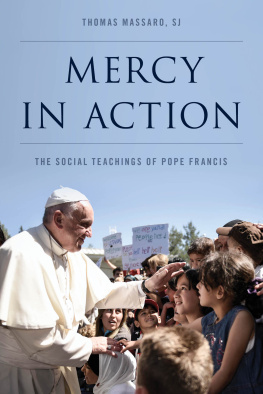
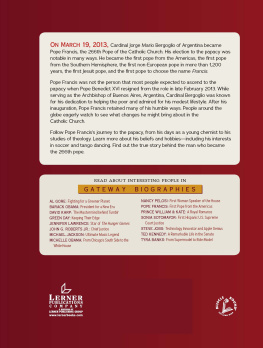

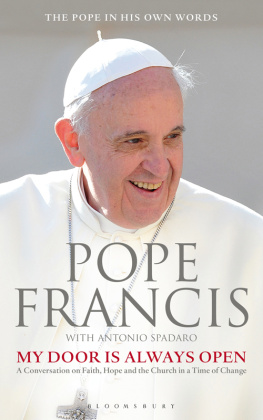
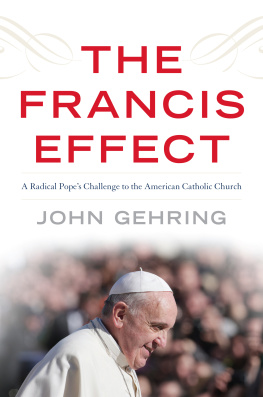


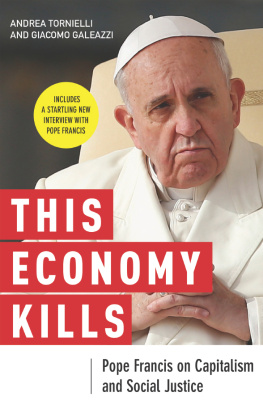
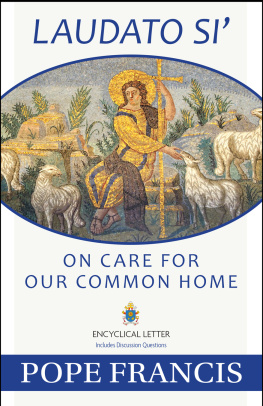
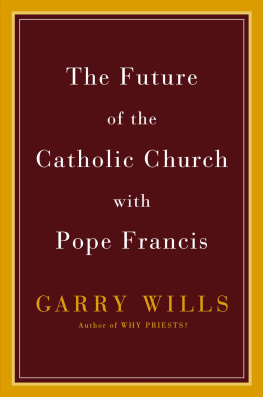
 TM The paper used in this publication meets the minimum requirements of American National Standard for Information Sciences Permanence of Paper for Printed Library Materials, ANSI/NISO Z39.48-1992.
TM The paper used in this publication meets the minimum requirements of American National Standard for Information Sciences Permanence of Paper for Printed Library Materials, ANSI/NISO Z39.48-1992.